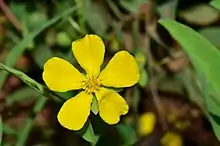| Hibbertia silvestris | |
|---|---|
 | |
| Scientific classification | |
| Kingdom: | Plantae |
| Clade: | Tracheophytes |
| Clade: | Angiosperms |
| Clade: | Eudicots |
| Order: | Dilleniales |
| Family: | Dilleniaceae |
| Genus: | Hibbertia |
| Species: | H. silvestris |
| Binomial name | |
| Hibbertia silvestris | |
Hibbertia silvestris is a species of flowering plant in the family Dilleniaceae and is endemic to the south-west of Western Australia. It is a prostrate to more or less erect or spreading shrub with hairy young branchlets, elliptic to egg-shaped leaves with the narrower end towards the base and yellow flowers with seven to ten stamens on one side of two softly-hairy carpels.
Description
Hibbertia silvestris is a prostrate to more or less erect or spreading shrub that typically grows to a height of 20–50 cm (7.9–19.7 in), its young branchlets covered with long, soft hairs and short star-shaped hairs. The leaves are hairy, elliptic to egg-shaped with the narrower end towards the base, mostly 8–10 mm (0.31–0.39 in) long and 3–5 mm (0.12–0.20 in) wide. The flowers are arranged singly in leaf axils on a pedicel 7–15 mm (0.28–0.59 in) long with narrow lance-shaped bracts 5–7 mm (0.20–0.28 in) long at the base. The five sepals are egg-shaped, 4.5–5.5 mm (0.18–0.22 in) long and hairy and the five petals are yellow, 6–8 mm (0.24–0.31 in) long and egg-shaped with the narrower end towards the base. There are seven to ten stamens on one side of the two softly-hairy carpels, and five to twelve staminodes on the other side of the carpels, each carpel with two ovules. Flowering occurs from August to January.[2][3]
Taxonomy
Hibbertia silvestris was first formally described in 1904 by Ludwig Diels in Botanische Jahrbücher für Systematik, Pflanzengeschichte und Pflanzengeographie.[4][5] The specific epithet (silvestris) means "living in woods".[6]
Distribution and habitat
This hibbertia grows in moist forest in the Jarrah Forest, Swan Coastal Plain and Warren biogeographic regions of south-western Western Australia.[3]
See also
References
- ↑ "Hibbertia silvestris". Australian Plant Census. Retrieved 4 October 2021.
- ↑ Thiele, Kevin R.; Cockerton, Geoff (2014). "A revision of the Hibbertia hypericoides species group (Dilleniaceae)" (PDF). Nuytsia. 23: 298–300. Retrieved 4 October 2021.
- 1 2 "Hibbertia silvestris". FloraBase. Western Australian Government Department of Biodiversity, Conservation and Attractions.
- ↑ "Hibbertia silvestris". APNI. Retrieved 4 October 2021.
- ↑ Diels, Ludwig; Pritzel, Ernst G. (ed.) (1905). "Fragmenta Phytographiae Australiae occidentalis. Beitrage zur Kenntnis der Pflanzen Westaustraliens, ihrer Verbreitung und ihrer Lebensverhaltnisse". Botanische Jahrbücher für Systematik, Pflanzengeschichte und Pflanzengeographie. 35 (2–3): 386–387. Retrieved 4 October 2021.
{{cite journal}}:|first2=has generic name (help) - ↑ Sharr, Francis Aubi; George, Alex (2019). Western Australian Plant Names and Their Meanings (3rd ed.). Kardinya, WA: Four Gables Press. p. 307. ISBN 9780958034180.